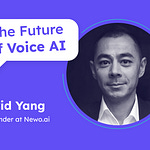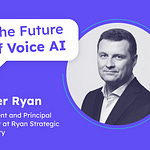In The Future of Voice AI series of interviews, I ask three questions to my guests:
- What problems do you currently see in Enterprise Voice AI?
- How does your company solve these problems?
- What solutions do you envision in the next 5 years?This episode’s guest is Gadi Shamia, Founder & CEO at Replicant.
Gadi Shamia is the CEO and co-founder of Replicant. Prior to Replicant, Gadi helped to take Talkdesk from a seed-stage company to a unicorn as its COO, and played a key role in architecting and executing its 20X growth in people and revenue. Shamia also served as a senior executive at SAP and is a three-time founder with a depth of experience in the contact center space.
Replicant uses AI to automatically resolve customer issues over the phone or through messaging platforms without human intervention. Replicant's AI aims to provide instant, 24/7 customer service for a variety of use cases such as Appointment & Scheduling, Dispatch, First Notice of Loss, Outbound Calling Reminders, Authentication, and others. Replicant is focused on reducing wait times, lowering operational costs, and improving customer satisfaction by handling repetitive tasks, allowing human agents to focus on more complex inquiries.
Recap Video
Summary
Replicant's Impact and Evolution: Gadi discussed the company's journey and its conversational AI platform designed to automate customer service. Replicant's AI handles repetitive customer service tasks, aiming to enhance efficiency, lower costs, and improve satisfaction by allowing human agents to focus on complex issues. An unexpected benefit highlighted was the reduction in agent attrition rates and short-term disability claims, indicating a positive impact on employee well-being.
AI and Human-Agent Collaboration: Gadi emphasized the evolving partnership between AI, human agents, and customers. He highlighted that automation is not about replacing human agents but about enhancing their capabilities to handle more complex issues. This approach aims to balance efficiency with maintaining a human touch in customer service.
Defining Repetitive Tasks: The conversation delved into identifying and automating "transactional" calls in customer service, which cover a wide range of scenarios from emergency roadside assistance to appointment scheduling. Gadi illustrated how Replicant's AI can improve response times and ensure customer safety through risk assessment.
Technology and Integration: Gadi discussed leveraging LLMs to better understand customer intent and generate dynamic responses, showcasing the ability to handle a broader set of queries with higher accuracy. He also emphasized the importance of system redundancy and robust integration with customer service ecosystems to ensure reliability.
Consumer Adoption and Future Outlook: Despite initial skepticism, there's been a positive shift in consumer and agent perceptions towards automated customer service. Gadi predicted a significant increase in automation adoption within the next five years, suggesting that automation will become a critical component of customer service, with machines handling a substantial portion of calls. He envisioned a future where automated services could offer faster and more accurate responses than humans for certain tasks, leading to new, more impactful roles for human agents.
Takeaways
Advancements in Conversational AI for Customer Service: Replicant has developed a conversational AI platform that automates customer service tasks, significantly improving efficiency and customer satisfaction. The platform addresses the repetitive nature of many customer service inquiries, allowing human agents to focus on more complex issues.
Impact on Employee Well-being: The deployment of Replicant's technology has led to unexpected benefits, such as reduced agent attrition rates and a notable decrease in short-term disability claims among agents. This indicates that relieving agents from handling mundane tasks not only improves their job satisfaction but also their overall well-being.
The Evolving Role of Human Agents: Gadi highlighted the evolving relationship between AI, human agents, and customers. Despite the automation of transactional calls, there remains an essential role for human agents, particularly in handling complex or emotionally charged issues. This tripartite relationship underscores the complementary nature of AI and human skills in customer service.
Transactional vs. Unique Inquiries: While a significant portion of customer service calls are transactional and well-suited for automation, unique inquiries still require human intervention. Replicant's AI is adept at managing a wide range of transactional tasks, from emergency roadside assistance to appointment scheduling, demonstrating the versatility and potential of conversational AI.
The Role of LLMs: Replicant leverages LLMs to enhance its ability to understand and respond to customer inquiries, particularly for less common requests. This technology enables the AI to generate dynamic responses and handle a broader array of queries with greater accuracy.
Consumer and Agent Adoption: Despite initial skepticism, both consumers and agents have increasingly accepted and appreciated the efficiency and effectiveness of AI-driven customer service. This acceptance is anticipated to grow as AI technology continues to improve and as more people experience high-quality automated service interactions.
Future Outlook: Gadi predicts significant growth in the adoption of automation in customer service, suggesting that in five years, a substantial portion of customer service interactions will be automated. This shift is expected to enhance service quality and efficiency, create new roles for human agents, and fundamentally change expectations around customer service interactions.











